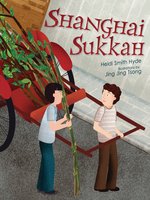מאת Heidi Smith Hyde
פורמטים זמינים-
- OverDrive Read
- PDF eBook
מהדורה-
שפות:-
עותקים-
-
זמין:1
-
עותקים בספריה:1
רמות-
-
רמת ATOS:4.4
-
מדדLexile :650
-
רמת עניין:LG
-
קושי טקסט:2 - 3
על המחבר-
- Heidi Smith Hyde is the director of education of Temple Sinai in Brookline, Massachusetts. Her books include Feivel's Flying Horses, a National Jewish Book Award Finalist, and Mendel's Accordion, winner of the Sugarman Award.
ביקורות-
-

August 3, 2015
As she did in Elan, Son of Two Peoples (2014), Hyde explores how Jewish traditions thrived in another cultural context, in this case the struggles and successes of European Jews who immigrated to China ahead of WWII. Although "Shanghai was nothing like Berlin," a boy named Marcus slowly adjusts to his new home, finding support in fellow young immigrants and a new Chinese friend, Liang. Liang points out that the approaching Moon Festival celebrates the harvest like the Jewish holiday of Sukkot, and lanterns from the festival eventually decorate the rooftop sukkah that Marcus and his friends build from bamboo. Rendered in an urban palette of pale grays and browns, Tsong's (A Bucket of Blessings) crisp digital collages come alive during the Moon Festival as a dragon races down the street during a parade and orange lanterns cast a warm glow on the night streets. Themes of friendship and perseverance come through strongly, and an afterword offers intriguing background information about (and archival photos of) the Jewish immigration to China. "During a time when most countries looked the other way," writes Hyde," China offered a haven." Ages 5â9. -

November 1, 2015
K-Gr 2-Marcus tries to make the best of his new home after his family flees Berlin for Shanghai to escape the Nazis. There, he makes friends with other Jewish boys and a Chinese boy named Liang. As the Sukkot holiday nears, Marcus wonders where and how his family can build their sukkah. With the help of his friends, they build one out of bamboo on the roof of their building. Due to food shortages, they cannot decorate the hut with the traditional fruits and vegetables. Liang tells Marcus about the upcoming Moon Festival, which is happening the next day. The boys celebrate both holidays together, and Liang adds red Chinese lanterns to the sukkah to help illustrate the warmth of friendship. A spread at the end gives some basic information about Jewish refugee life in Shanghai, including photographs. Tsong mixes printmaking and digital art for large, bright illustrations. The endpapers, which feature a street scene depicting Jewish and Chinese life, are especially lovely. The reasons why Marcus's family need to leave Europe are glossed over, keeping this holiday story light. VERDICT This heartwarming tale examines a little-known vibrant Jewish community while focusing on the joys and discovery of friendship.-Jennifer Rothschild, Arlington County Public Libraries, VA
Copyright 2015 School Library Journal, LLC Used with permission.
-

May 1, 2015
In Shanghai's Hongkew district, two boys, one German-Jewish, one Chinese, share in the celebration of their two harvest holidays, Sukkot and the Moon Festival. Having fled Berlin with his family in advance of the Holocaust, 10-year-old Marcus is trying to make the best of their exile in the crowded Jewish neighborhood that's nestled in the bustling Chinese city. While most of his fellow yeshiva students keep to themselves, Marcus makes a new friend, Liang, bonding despite language and cultural differences. When autumn holidays approach, Marcus explains the tradition of building a sukkah, or traditional ceremonial hut, and happily accepts Liang's offer of help in its construction, though he's disappointed that the family's poverty means they can't use fruits and vegetables to decorate it. Seeing his friend's sadness, Liang invites Marcus to experience the Moon Festival, with its colorful red lanterns, moon-shaped cookies, and games. Liang's idea to decorate the sukkah with bright lanterns provides a welcome bridge between the two cultures. Tsong uses lithographs to create a layered, textured look, employing dark, drab hues to depict the poverty-stricken tenement district and vivid greens and red-orange tones for the sukkah and its lanterns. Hyde's straightforward text assumes basic understanding of the Holocaust, focusing on Marcus' experiences in Shanghai. While both holidays are but lightly sketched, themes of friendship and respect across cultures are compelling. (historical note) (Picture book. 5-8)COPYRIGHT(2015) Kirkus Reviews, ALL RIGHTS RESERVED.
-

October 15, 2015
Grades 1-3 Marcus and his family flee Nazi Germany and move to a Shanghai neighborhood packed with other Jewish families. Though life in China is vastly different, he is determined to make it a home, and it seems more possible when he befriends Liang, a Chinese boy from the neighborhood. As Sukkot approaches, Marcus is eager to build a sukkah, even though wood is scarce and he has no yard. With the help of Liang and his friends from yeshiva, Marcus builds a bamboo sukkah on his roof. Sadly, he cannot decorate it like he would in Germany, but Liang lifts his spirits by taking him to his traditional harvest celebration, the Moon Festival. Tsong's blocky, textured illustrations reveal Chinese and Jewish families peacefully coexisting, perhaps best illustrated by the bamboo sukkah decorated with, instead of fruit and vegetables, warmly glowing red paper lanterns. While it would have benefited from more details about both holidays, this heartwarming story of cultural exchange, closing with a note about the Jewish refugee population in Shanghai, is well suited to classroom use.(Reprinted with permission of Booklist, copyright 2015, American Library Association.)
פרטי כותר+
-
מו"ל
Lerner Publishing Group -
OverDrive Read
תאריך יציאה: -
PDF eBook
תאריך יציאה:
מידע על זכויות דיגיטליות+
- הגנת זכויות יוצרים (DRM) הנדרשת על ידי המוציא לאור יכולה להיות מופעלת על הכותר הזה על מנת להגביל או לאסור הדפסה והעתקה. שיתוף קבצים והפצה אסורים. הגישה שלכם לגשת לחומר הזה פגה בסוף תקופת ההשאלה. אנא ראו I הערה חשובה לגבי חומר המוגן בזכויות יוצרים עבור תנאים המיושמים על החומר הזה.
Status bar:




